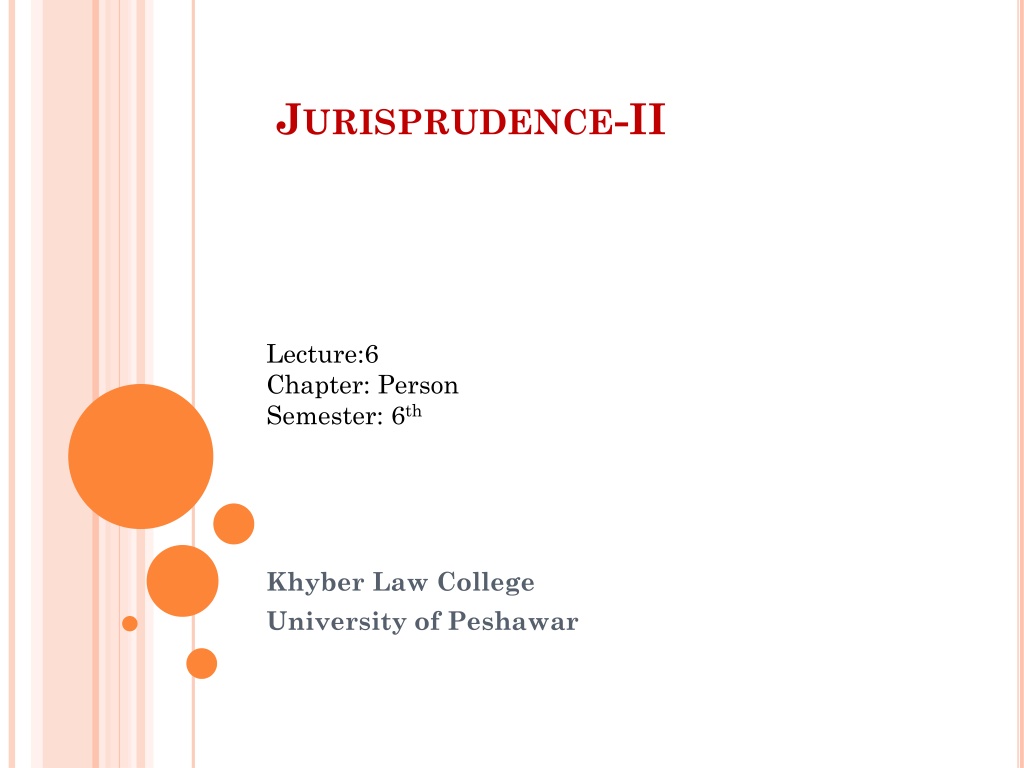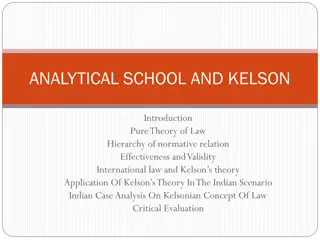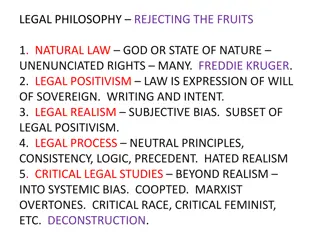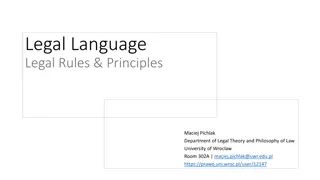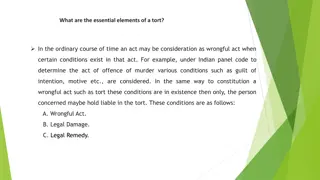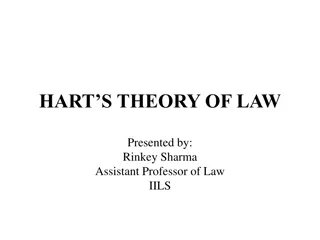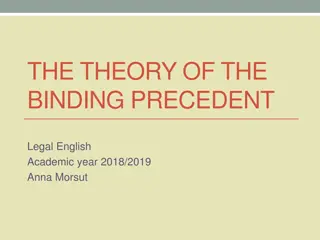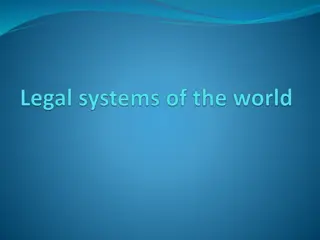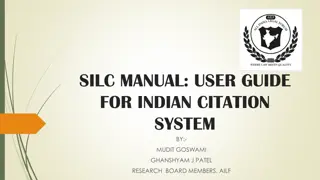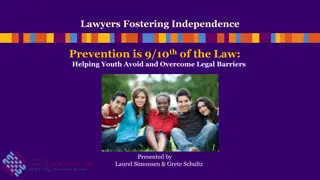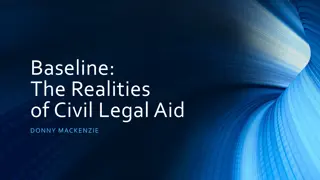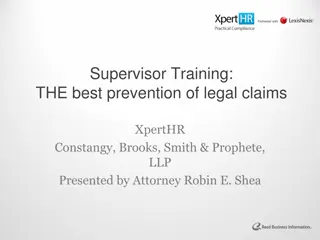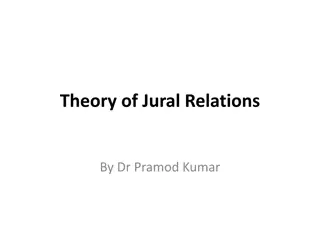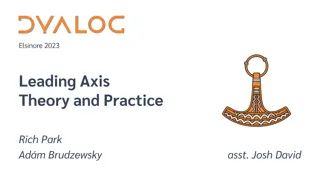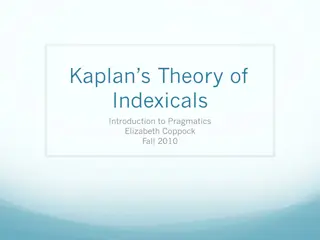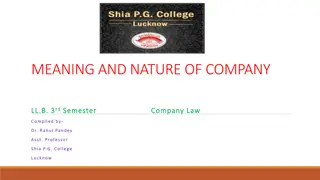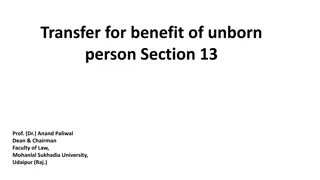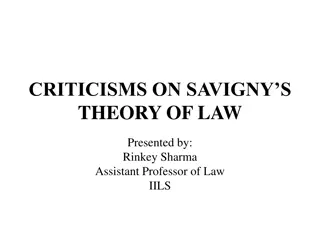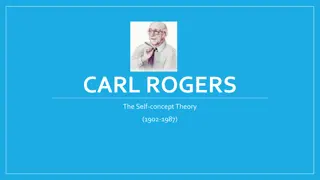Understanding the Concept of Person in Legal Theory
The concept of a person in legal theory encompasses a broader definition beyond just human beings. It includes entities such as associations, corporations, and institutions recognized by law. The term person signifies the ability to have rights and duties, whether it be a natural person or a legal entity. Various definitions from legal scholars like Salmond, Savigny, Gray, and Austin shed light on the legal recognition of different beings as persons. Exploring the nuances of personhood helps in understanding the diverse applications of rights and responsibilities in the legal framework.
Download Presentation

Please find below an Image/Link to download the presentation.
The content on the website is provided AS IS for your information and personal use only. It may not be sold, licensed, or shared on other websites without obtaining consent from the author. Download presentation by click this link. If you encounter any issues during the download, it is possible that the publisher has removed the file from their server.
E N D
Presentation Transcript
JURISPRUDENCE-II Lecture:6 Chapter: Person Semester: 6th Khyber Law College University of Peshawar
AGENDA Introduction Literal meaning Definition Kinds Conclusion
INTRODUCTION Literal meaning The term person is derived from Latin word persona which means a mask worn by actors playing different roles in a drama. In anthropological sense person means as one of the species. In modern days it has been used in a sense of a living person capable of having rights and duties. Now it has been used in different senses in different disciplines. In the philosophical and moral sense the term has been used to mean the rational quality of human being.
INTRO In ordinary parlance person means living men and women. All human beings are not person in the eye of law. There are human beings who are not persons. For Example Slaves; conversely, there may be persons who are not human beings, e.g., a Corporation, Institution, Idol etc. Likewise, infants, saints, lunatics are awarded the status of restricted personality. Personality, therefore, has a wider signification than humanity.
INTRO Legally: In law it has a wide meaning. It means not only human beings but also associations as well. Law personifies some real thing and treats it as a legal person. This personification both theoretically and practically clarifies thought and expression.
INTRO Human beings but not persons: There are human beings who are not persons in legal sense such as outlaws and slaves (in early times). Not human beings but person: In the same way there are legal persons who are not human beings such as corporations, companies, trade unions; institutions like universities, hospitals are examples of artificial personality recognized by law in the modern age. Important concept in law: Hence, the person is an important category of concept in legal theory, particularly business and corporate laws have extensively used the concept of person for protection as well as imposing the liability.
DEFINITION Salmond - " A person is any being whom the law regards as capable of rights and bound by legal duties. Savigny defines the term person as the subject or bearer of a right. According to Gray A person is an entity to which rights and duties may be attributed. According to Austin the term 'person' includes physical or natural person including every being which can be deemed human. According to Section 11 of the Indian Penal code the word person includes any company or association, or body of Persons, whether Incorporated or not.
KINDS OF PERSONS (i) Natural Person A natural person is a living human being e.g., men, women and impotent. Natural persons are real human beings to whom the law grants personality on the basis of reality. (ii) Artificial / Legal Person Legal persons are artificial, fictitious persons or imaginary beings to whom law attributes personality by way of fiction where it does not exist in fact e.g., Corporation, Institution, University, Club etc. They are capable of rights and duties like natural persons.
CHARACTERISTICSOFALEGALPERSON: Creation of law: Legal Person is created by Law only. Without the knowledge of law, no legal personality can be created. Since it was felt by the dynamic society that the natural persons by themselves cannot take the responsibility of all their activities therefore it was thought necessary to confer legal personality to not only living entities rather non-living ones also.
STATUSOFDEADPERSON Status of Dead Person Dead person in general have no rights because they have no interests. Their legal personality is extinguished by death. It is said that the legal personality is created from birth & ends with death but sometimes desire of a dead person is protected by law. Basically the dead person gets three types of rights:
STATUSOFDEADPERSON Relating to his body (burial): The legal system recognizes decent burial of dead person. Relating to reputation: As far as reputation is concerned, the legal system protects the reputation of the dead person to some extent. This is mainly true in, cases of defamation-it is said that even a dead person has a right to safeguard his reputation. Any defamatory statement which affects the reputation of the family of dead person or the dead person himself is protected by the legal system under the civil as well as criminal liability. Related to his estate: By way of testamentary succession, a man can after his death, may continue to regulate and determine the disposition and enjoyment of his property which he owned while living.
LEGALSTATUSOFANIMAL Animals In the present day context, the animals are deemed incapable of possessing legal rights & duties. They are merely things, often the objects of legal rights and duties but they are never subjects of them. For example:- A beast has no legal personality. Anything done to the animals may be a wrong to its owner or to the society but it is no wrong to the beast. But the animals have two rights to be protected. 1. Cruelty to animals is made a criminal offence. 2. A trust for benefit for a particular class of animals as opposed to one for individual animal is valid and enforceable as a public and charitable one. Rights and duties are correlative . and duty cannot be imposed on animals.
LEGAL STATUSOF UNBORN PERSON Legal Status of Unborn Person Generally an unborn person has no legal standing in the eyes of law. However it has to be distinguished from the one who is living but not yet born, i.e., a child in womb of its mother-in utero and an unborn child in the sense of future generations. A child in the uterus is regarded as a person in law in accordance with the maxim Nascitures Pro Ham Nato Habetur i.e. One who is to be born is deemed to have been born .
LEGAL STATUSOF UNBORN PERSON Contingent rights: The rights of an unborn person, whether personal or proprietary, are all contingent on his birth as a living human being. Damages: damages can be claimed for injury to the fetus of a woman if the woman was known to be pregnant. Posthumous child can claim compensation for the death of his father in fatal accident. In Hindu law unborn son acquires an interest in the joint family property from the time of its conception. In English law a posthumous child inherits and if born alive though it may die moments later it affects the course of succession. A women convicted cannot be executed if she is pregnant. If a child is born alive and later on dies due to injuries caused to him in the womb, the person causing the injuries may be tried for murder.
